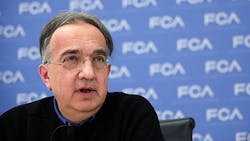FCA CEO Marchionne: Trump is an Auto Industry Game Changer
President-elect Donald Trump’s critical stance toward free trade could affect Fiat Chrysler Automobiles NV’s business in North America, according to the Italian automaker’s chief executive officer Sergio Marchionne.
Trump’s election “certainly is a game changer, mainly because I think that there are a number of conditions in the U.S. which are not yet spelled out,” Marchionne told Bloomberg Television at an Alfa Romeo plant in Cassino, Italy. Statements Trump has made about trade are “a big issue” because of the North American Free Trade Agreement’s impact on Fiat’s operations in the U.S., Mexico and Canada.
Trump frequently slammed NAFTA during his campaign, describing it as the worst deal ever and blaming it for U.S. job losses. The President-elect has singled out Ford Motor Co. for making cars in Mexico and has called for imposing a 35% tariff on products made by companies that move their production from the U.S. to other countries. Since 2010, nine global automakers, including General Motors Co., Ford and Fiat have announced more than $24 billion in Mexican investments.
Fiat, which generates the lion’s share of its profits in North America, assembled about 17% of all the vehicles it made in that region in Mexico in the first ten months, according to Kevin Tynan, Bloomberg Industry senior analyst. Almost all of those cars were sold in the U.S. and Canada.
“The company would incur hefty costs if the Trump administration is able to enact a 35% levy on vehicles and parts imported into the U.S.,” Tynan said.
Marchionne warned in June that a Trump victory could impact the carmaker’s production options in North America, depending on the way he manages NAFTA and whether he supports protectionist views. The Fiat CEO said he hasn’t spoken with Trump but will work with the new administration.
The change in U.S. leadership is not only impacting carmakers’ trade prospects. Fiat shares have gained 14% since the Nov. 8 vote, with a jump three days later after Trump chose a prominent climate change skeptic to lead his Environmental Protection Agency transition team. That fueled speculation that the new administration may loosen fuel-economy rules, which would benefit makers of conventional engines. In addition, gains by the U.S. dollar since the election are positive for Fiat, Marchionne said.
by John Follain, Flavia Rotondi and Tommaso Ebhardt
About the Author
Bloomberg
Licensed content from Bloomberg, copyright 2016.
